Discover folk - the CRM for people-powered businesses
Winning public contracts is tough.
👉🏼 Try folk now to centralize contract deadlines and agency contacts
You're juggling strict compliance rules, endless documentation, and multiple agencies—all at once.
You need clarity. Speed. Control.
That's where a CRM built for government contractors comes in.
It helps you centralize contract data, track every agency interaction, and manage your pipeline—without missing a deadline.
Who this guide is for
In this guide, discover the best CRM for government contractor success: tools that boost productivity, simplify compliance, and help you win more bids.
The 5 best CRMs for government contractors
1. folk
folk is a modern CRM platform specifically designed for mid-sized government contracting teams of 20-50 people, offering customizable pipelines, AI-driven contact enrichment, and streamlined workflows to enhance deal management and prospecting efficiency.

Key features
- Contact enrichment: Automatically enriches contact details by finding emails and LinkedIn URLs of government procurement officers and agency decision-makers, enabling efficient outreach without manual data entry or additional costs.
- Social media integration: Seamlessly import contacts from LinkedIn, Instagram, Twitter and more to track government agency contacts and procurement officers within folk, using templates for quicker, streamlined communication.
- Mail merge and email sequences: Full email sync, templates, and tracking features, enabling contracting teams to manage all government agency communications directly from the CRM.
- AI-powered features: AI tools assist in managing government contacts and procurement relationships, automating routine compliance tasks, and suggesting actions to improve contract win rates.
- Integrations: folk connects via its open API and native integrations (e.g., Kaspr, Allo, Salesforge, PandaDoc) and also through Zapier and Make to 6,000+ tools.
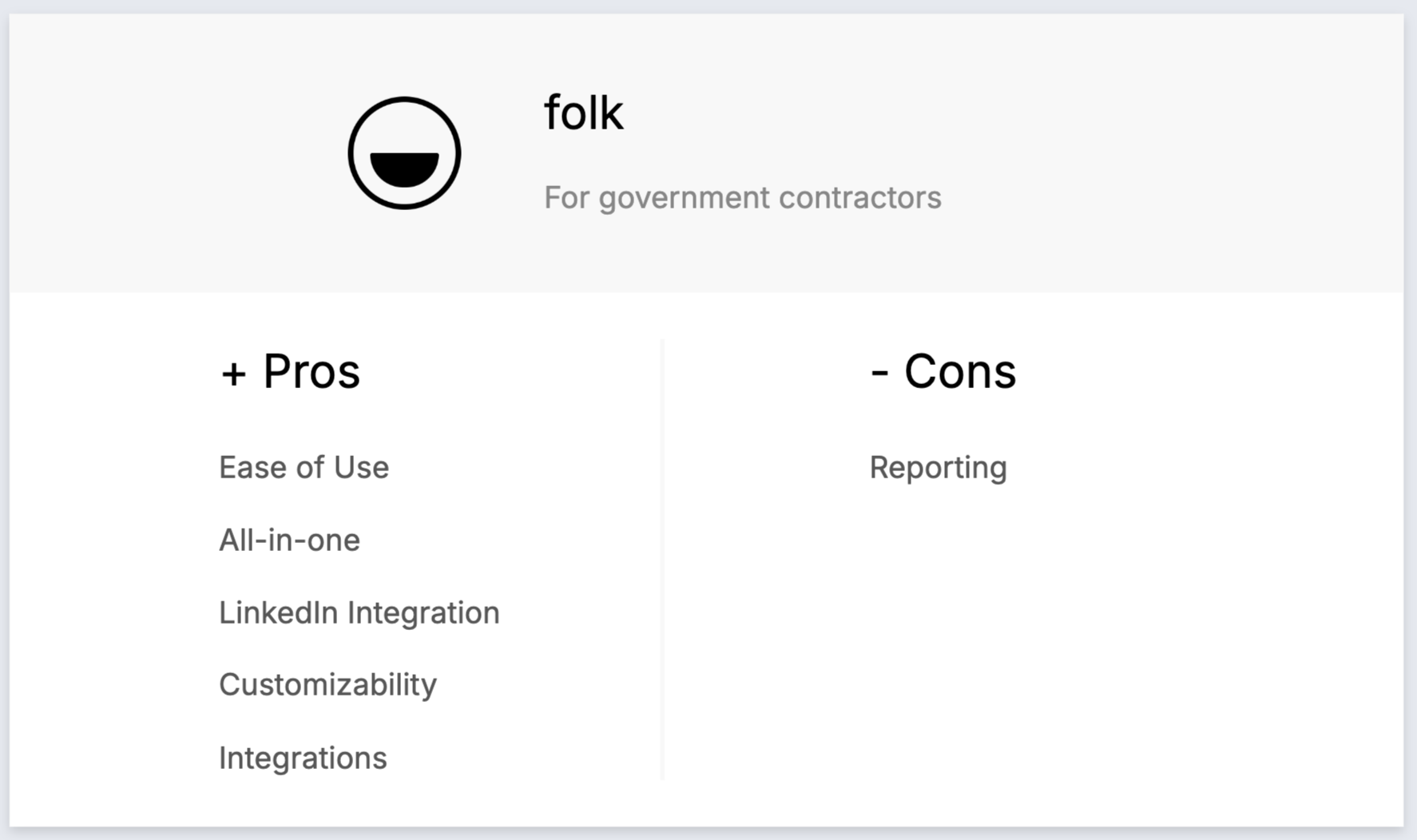
Pros
- Perfect for mid-sized teams: folk is optimized for government contracting teams of 20-50 people, providing the right balance of functionality and simplicity without overwhelming features that larger enterprise solutions offer.
- Government contractor workflow: folk streamlines the entire government contracting process by allowing teams to import agency contacts from LinkedIn, automatically find procurement officer emails, reach out through customizable proposal sequences, and track contract opportunities in specialized pipelines.
- Full customizability for compliance: Teams have complete control over custom fields for contract types, compliance requirements, security clearance levels, and specialized workflows that government contractors need.
- Cost-effective scaling: At $20 per user per month, folk provides exceptional value for growing government contracting teams, eliminating the need for multiple tools while staying within mid-sized company budgets.
Cons
- Reporting: folk offers advanced analytics—pipeline and deal stage analytics, revenue forecasting with weighted probabilities, and breakdowns by owner, channel, industry, region, or any custom field—enabling teams to track government contract performance using custom fields and dashboards.
Price and plans
You can try folk for free with a 14-day free trial—perfect for government contracting teams to test workflows. After that, monthly or annual subscription plans are as follows.
- Standard: $20 per user, per month—ideal for teams of 20-50 people.
- Premium: $40 per user, per month—includes advanced automation for larger contract pipelines.
- Custom: Starts from $80 per user, per month—for specialized government compliance requirements.
2. HubSpot
Hubspot CRM is a comprehensive platform offering integrated tools for managing sales, marketing, customer service, and operations, though it can become expensive for government contracting teams as they scale beyond basic features.

Key features
- Sales Hub: Provides deal tracking, pipeline management, sales automation, and reporting, essential for managing government contracts efficiently.
- Marketing Hub: Includes email marketing, ad tracking, landing pages, and lead generation tools to help government contractors attract and engage potential leads.
- Service Hub: Offers customer service tools like ticketing, live chat, and knowledge bases, ensuring excellent support for government clients.
- Operations Hub: Syncs and automates business processes across different systems, streamlining operations for government contractors.
- Lead scoring: Prioritize leads with predictive scoring to improve sales efficiency and focus on high-potential government contracts.
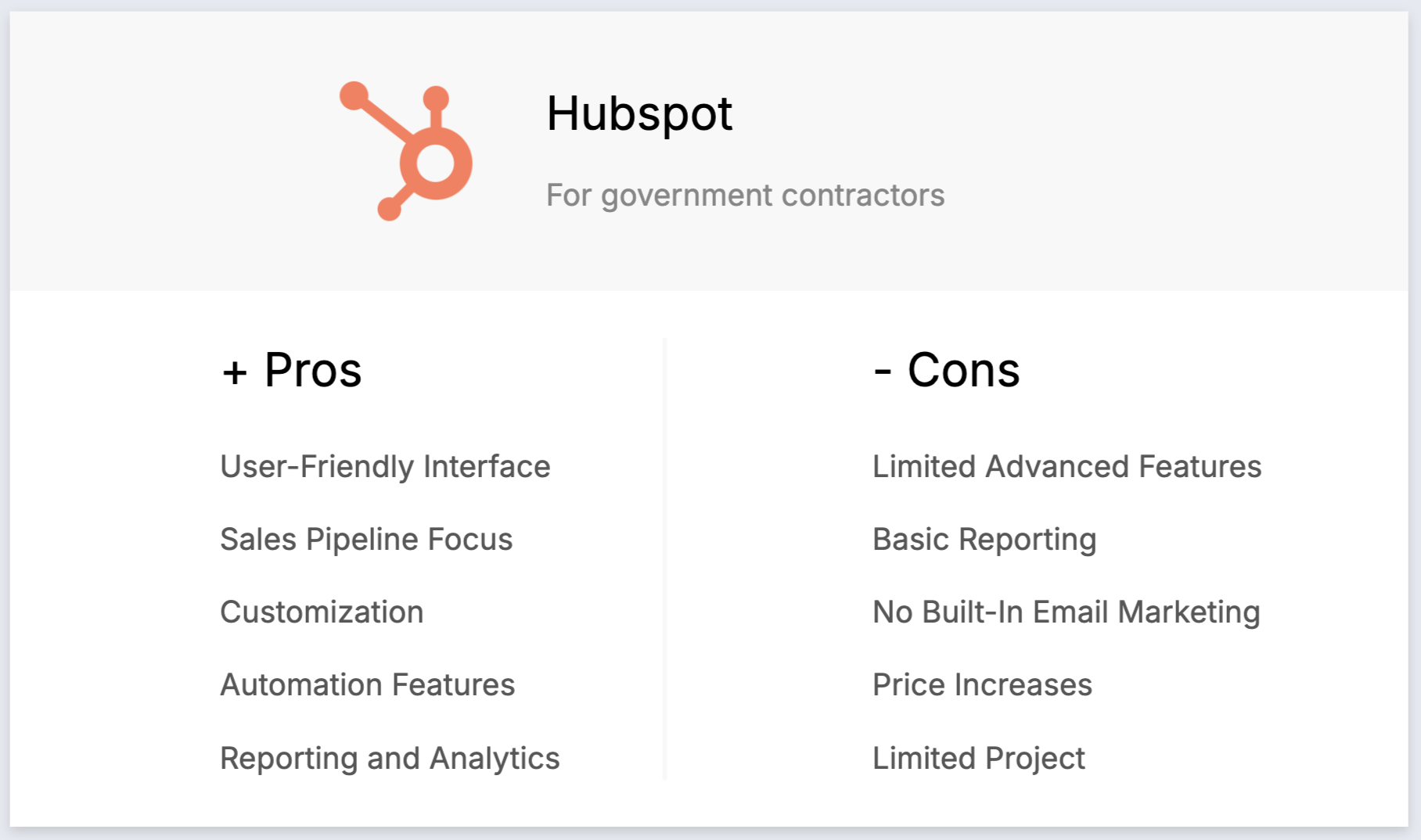
Pros
- User-friendly interface: The intuitive and easy-to-use interface makes it accessible for users of all skill levels, crucial for government contractors who need quick onboarding.
- Seamless integration with marketing tools: Integrates smoothly with marketing, sales, and service hubs, creating a unified platform for managing government contracts and customer relationships.
- Automation capabilities: Provides powerful automation tools for tasks like email marketing, lead nurturing, and sales workflows, saving time and improving efficiency.
- Customizable dashboard and reports: Allows users to create customized dashboards and reports to track metrics and gain insights into government contract performance.
- Strong customer support: Offers excellent customer support, including live chat, phone support, and a vast knowledge base, ensuring government contractors have the help they need.
Cons
- High cost at higher tiers: The pricing can become expensive as you move to higher tiers, which may be prohibitive for mid-sized government contracting teams of 20-50 people as they scale.
- Limited customization in free plan: The free plan and lower tiers have limited customization options, which can restrict flexibility for growing government contractors.
- Complexity in advanced features: Some advanced features, such as custom reporting and workflows, have a steep learning curve and may require additional training.
- Email marketing limits: Email marketing functionality in the free plan is restricted by limits on the number of emails you can send, which can be a drawback for government contractors with larger lists.
- Additional costs for add-ons: Many useful features, like advanced CRM capabilities and integrations, come as paid add-ons, increasing the overall cost for teams of 20-50 people.
Price and plans
Prices and plans on the CRM suite for an annual subscription are as follows.
- Starter: $15 per user, per month.
- Professional: $450 per user, per month.
- Enterprise: $1,500 per user, per month.
3. Pipedrive
Pipedrive is a web-based CRM focused on visual pipeline management for small businesses, though it may lack the specialized features that government contracting teams of 20-50 people typically require for complex compliance tracking.

Key features
- Lead and deal management: Centralized tools to manage customer data, interactions, and sales pipelines, helping government contractors efficiently track and act on opportunities.
- Sales automation: Workflow automation to handle repetitive tasks, such as lead routing, follow-ups, and email sequences, allowing government contractors to focus on securing contracts.
- Email integration: Full email sync, templates, and tracking features, enabling users to manage all communications directly from the CRM, crucial for maintaining clear and consistent communication with government agencies.
- Advanced reporting and analytics: Real-time data analytics and custom reporting tools to track performance, forecast revenue, and gain actionable insights, essential for making informed decisions in the competitive government contracting space.
- Customization and security: Options to customize pipelines, fields, and user permissions, with robust security measures to protect sensitive government contract data.
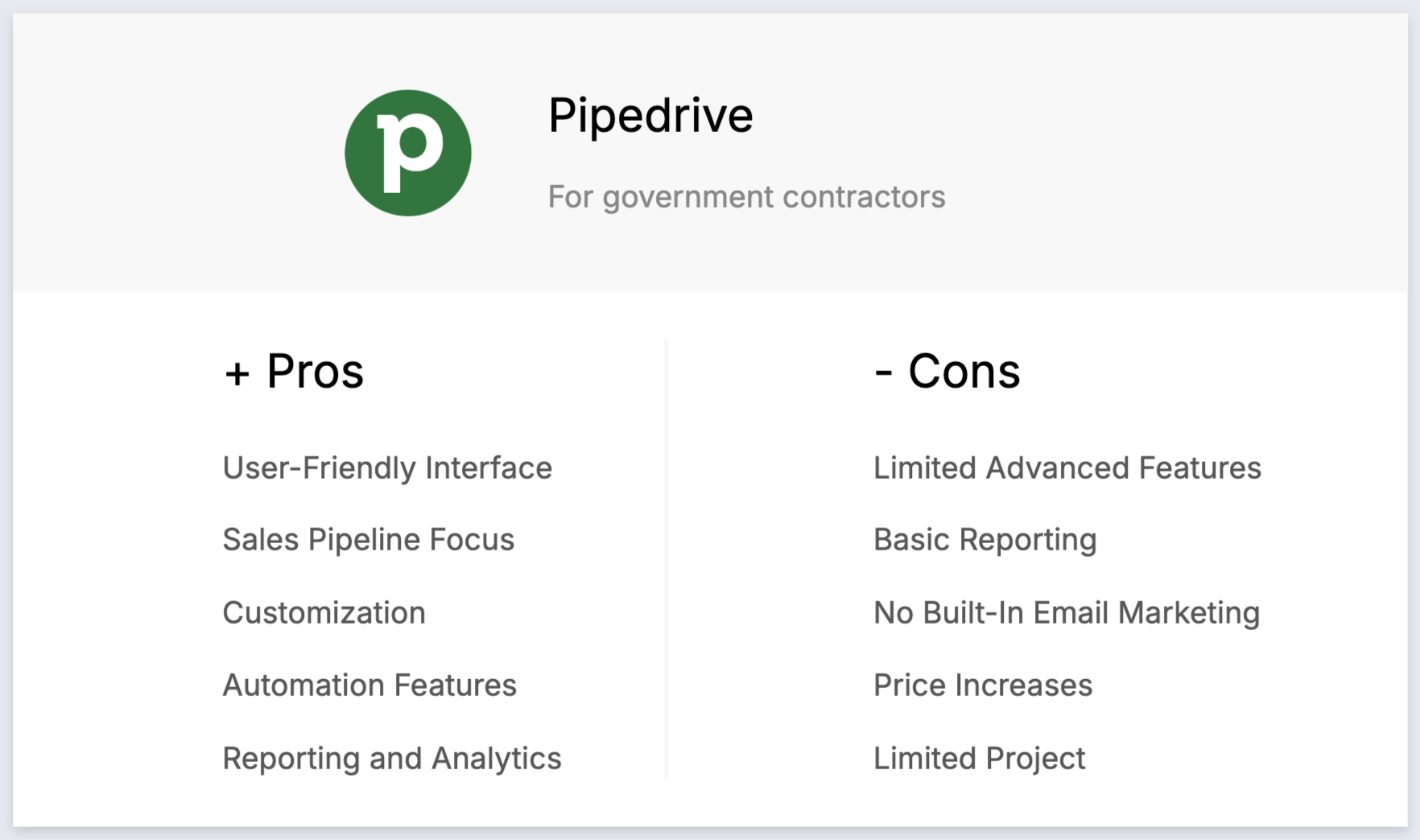
Pros
- User-friendly interface: The intuitive and visually appealing interface makes it easy for government contractors to navigate and manage their sales pipelines.
- Sales pipeline focus: Designed specifically for managing sales pipelines, offering a visual approach that helps government contractors track deals and activities effectively.
- Customization: Allows for a high degree of customization, enabling government contractors to tailor the platform to their specific processes with custom fields and workflows.
- Automation features: Includes automation tools that help streamline repetitive tasks, such as sending follow-up emails and moving deals through the pipeline, saving time and boosting productivity.
- Reporting and analytics: Offers robust reporting and analytics tools that provide valuable insights into sales performance and help identify areas for improvement, crucial for government contractors aiming to optimize their strategies.
Cons
- Limited advanced features: Lacks some of the more advanced CRM features, such as extensive marketing automation and AI capabilities, which are available in other platforms.
- Basic reporting in lower tiers: The reporting and analytics features in the basic plans are somewhat limited, requiring upgrades to access more in-depth insights.
- No built-in email marketing: Does not include built-in email marketing features, requiring users to integrate with third-party email tools for such functionality.
- Price Increases with add-ons: The cost can increase quickly when additional features or integrations are added, making it less cost-effective for government contractors with growing needs.
- Limited project management features: Primarily focused on sales, and lacks robust project management features, requiring the use of additional tools for project tracking.
Price and plans
An annual subscription plan basis is as follows.
- Essential plan: Starts from $24 per user, per month.
- Advanced plan: Starts from $44 per user, per month.
- Power plan: Starts from $79 per user, per month.
- Enterprise plan: Starts from $129 per user, per month.
4. Zoho
Zoho is a CRM system with a strong sales focus and comprehensive customization options, though it can be complex to set up and may require technical expertise that mid-sized government contracting teams don't always have readily available.

Key features
- Sales automation: Automates sales tasks like lead management, deal tracking, and follow-up actions.
- Customizable dashboards and reports: Allows users to create and customize dashboards and reports for in-depth analytics.
- Lead and contact management: Manages customer information, tracks interactions, and segments contacts for targeted campaigns.
- Workflow automation: Automates routine tasks and processes to improve efficiency and reduce manual effort.
- Security and privacy controls: Provides robust security features including role-based access, data encryption, and GDPR compliance.
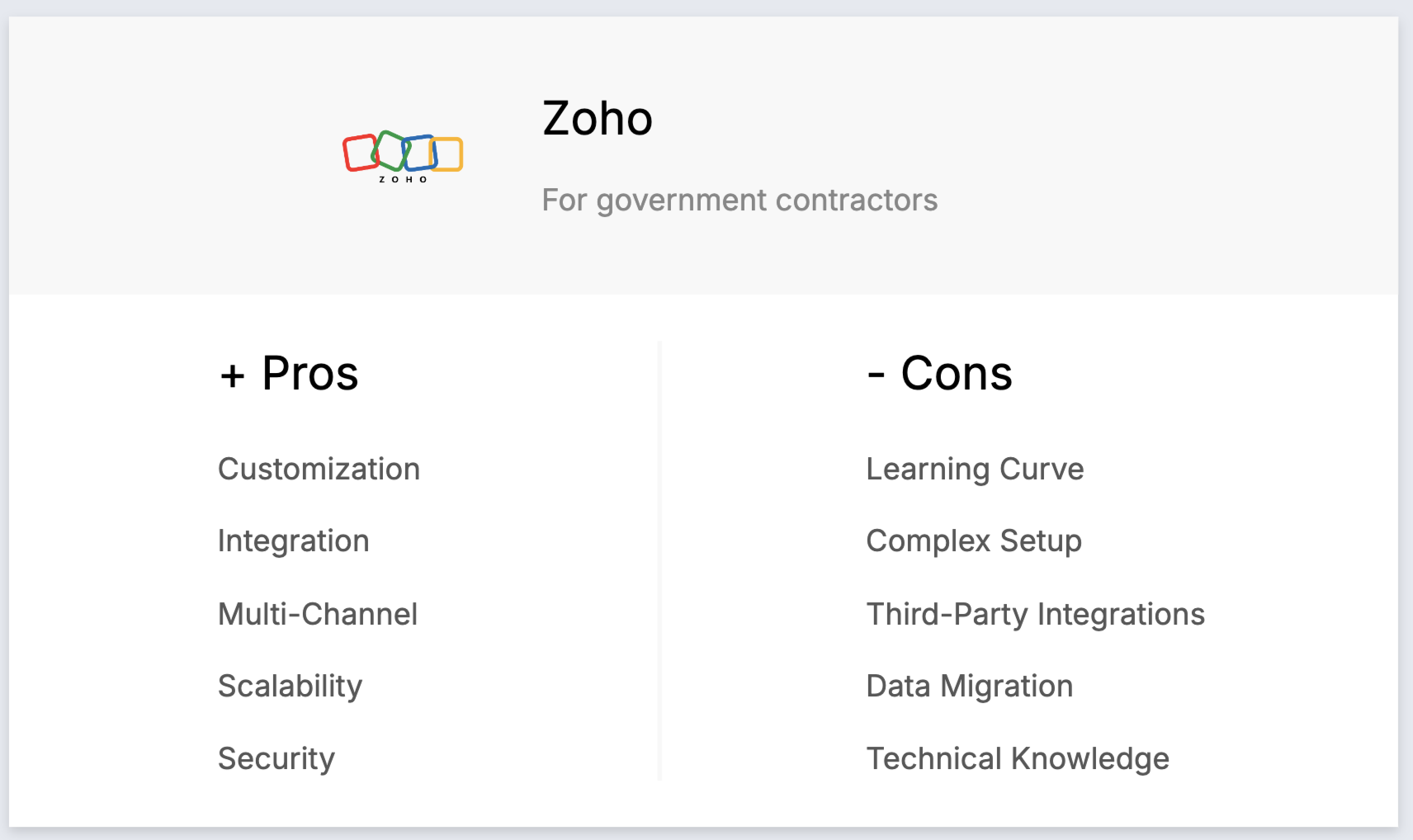
Pros
- Customization: Extensive customization options allow businesses to tailor the CRM to their specific needs, including custom fields, modules, and workflows.
- Integration with Zoho Suite: Seamless integration with other Zoho products (like Zoho Books, Zoho Projects, and Zoho Campaigns) creates a comprehensive ecosystem for managing different business functions.
- Multi-channel communication: Zoho CRM supports email, phone, social media, and live chat, enabling businesses to manage all customer interactions from a single platform.
- Scalability: The platform is highly scalable, making it suitable for growing businesses. It can support small teams and large enterprises alike, with features that scale with business needs.
- Strong security: Zoho CRM provides robust security measures, including data encryption, two-factor authentication, and role-based access, ensuring data protection and compliance.
Cons
- Steep learning curve: The extensive customization options can be overwhelming for new users, requiring a significant time investment to master the platform, which can be challenging for busy government contracting teams of 20-50 people.
- Complex setup: Initial setup and configuration can be complex, particularly for businesses without technical expertise or dedicated IT resources.
- Limited third-party integrations: While Zoho integrates well with its own suite of products, integration with third-party applications can be limited or require additional effort.
- Data migration challenges: Migrating data from other CRMs to Zoho can be difficult and time-consuming, often requiring manual adjustments.
- Customization requires technical knowledge: Advanced customizations often require technical expertise, which can be a barrier for non-technical users.
Price and plans
Free plan limited to three users suitable for small businesses. After that, an annual subscription plan is as follows.
- Standard: $20 per user, per month.
- Professional: $35 per user, per month.
- Enterprise: $50 per user, per month.
5. Salesforce
Salesforce is a robust CRM platform designed for large enterprises, offering extensive features for sales, marketing, service, and analytics, but it can be overly complex and expensive for mid-sized government contracting teams of 20-50 people.

Key features
- Comprehensive ecosystem: A unified platform offering CRM, marketing automation, customer service, and custom app development, suitable for the varied needs of government contractors.
- Customization and scalability: Salesforce is highly customizable and scalable, allowing government contractors to tailor the platform to complex workflows and manage significant growth.
- Artificial Intelligence (AI) integration: Salesforce Einstein offers AI-driven analytics and automation, providing insights that help government contractors optimize their strategies.
- Extensive integration capabilities: With Salesforce's AppExchange, government contractors can integrate the platform with a wide range of third-party applications, ensuring seamless operation across different business systems.
- Enterprise-grade security and compliance: Salesforce provides robust security measures and compliance features, critical for government contractors handling sensitive customer data.
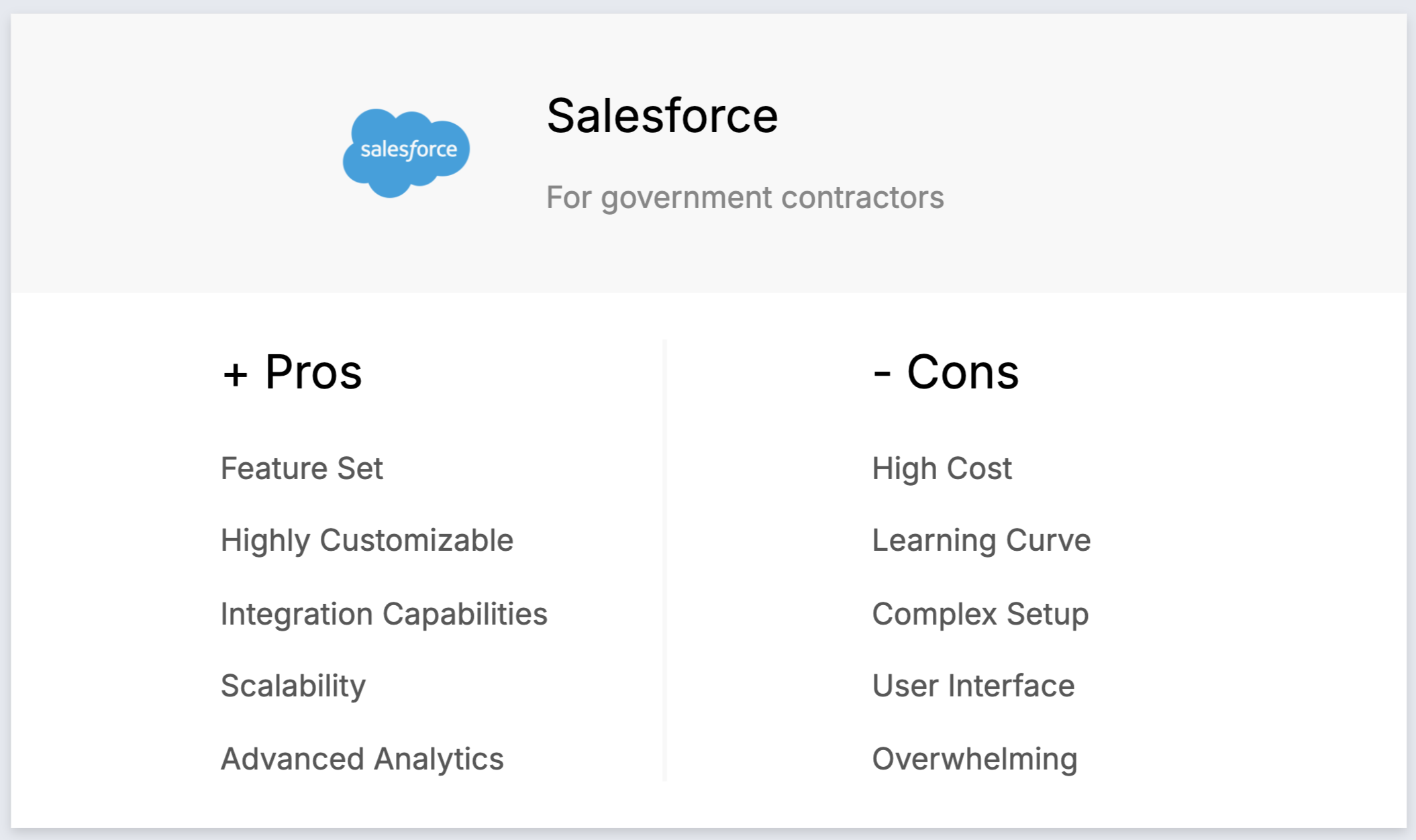
Pros
- Comprehensive feature set: Salesforce offers an extensive range of features covering sales, service, marketing, and more, making it a powerful tool for managing all aspects of government contractor relationships.
- Highly customizable: Salesforce is highly customizable, allowing government contractors to tailor the platform to their specific needs with custom fields, objects, and workflows.
- Extensive integration capabilities: Salesforce integrates with a vast array of third-party applications, as well as its own ecosystem of tools, enabling seamless data flow across platforms.
- Scalability: Salesforce is highly scalable, making it suitable for government contractors of all sizes, from small startups to large enterprises, with the ability to grow with your business.
- Advanced analytics and reporting: Salesforce provides powerful analytics and reporting tools, allowing government contractors to gain deep insights into their data and make informed decisions.
Cons
- High cost: Salesforce can be expensive, especially for mid-sized government contracting teams of 20-50 people, with high licensing fees and additional costs for add-ons and customization.
- Steep learning curve: Due to its extensive feature set and complexity, Salesforce often requires significant time and training for users to become proficient.
- Complex setup and customization: Initial setup and customization can be challenging and often require expert help or certified consultants, which adds to the overall cost.
- User interface: Some users find the Salesforce interface to be outdated and not as intuitive as other modern CRM platforms, which can hinder usability.
- Overwhelming for small teams: Salesforce's robust features may be overkill for mid-sized government contracting teams of 20-50 people, leading to underutilization of the platform's capabilities.
Price and plans
- Starter Suite: $25/user/month provides basic CRM features for small businesses.
- Pro Suite: $100/user/month includes advanced tools for growing businesses.
- Enterprise Plan: $165/user/month offers extensive customization and automation for large companies.
- Unlimited Plan: $330/user/month provides comprehensive features for large enterprises.
- Einstein 1 Sales: $500/user/month provides AI-driven insights and advanced features for large enterprises.
👉🏼 Try folk now to never miss a follow-up on government bids
Why you need a CRM
Government contracting is complex for teams of 20-50 people.
You juggle multiple contract deadlines, strict compliance requirements, and numerous agency stakeholders.
A CRM helps mid-sized contracting teams stay in control.
It centralizes contract data, automates compliance tasks, and streamlines agency communication.
With vs. Without a CRM for Government Contractors
Conclusion
The right CRM can transform how mid-sized government contracting teams of 20-50 people manage contracts and agency relationships.
Whether you're focused on procurement outreach, compliance tracking, or contract pipeline management, each tool in this list brings something valuable:
- folk CRM is specifically designed for teams of 20-50 people, keeping everything in one place with smart contact enrichment, LinkedIn sync, and government contractor workflows.
- HubSpot offers a full-suite approach for marketing, sales, and support, but becomes expensive for mid-sized teams.
- Pipedrive simplifies pipeline management with a visual interface, but lacks specialized government contracting features.
- Zoho delivers deep customization at a budget-friendly price, but requires technical expertise to set up properly.
- Salesforce powers complex operations at enterprise scale, but is overwhelming and expensive for teams of 20-50 people.
For government contracting teams of 20-50 people, folk CRM emerges as the clear winner, offering the perfect balance of functionality, ease of use, and cost-effectiveness specifically designed for your team size and use case.
Ready to test the best CRM for mid-sized government contracting teams? Try folk CRM for free
Need help deciding?
👉 Use our free tool to find the best fit for your team.
FAQ
What is the best CRM for government contractors?
Top options include folk, HubSpot, Pipedrive, Zoho, and Salesforce. Choice depends on team size, budget, and compliance needs. For mid-sized teams (20–50), folk offers contact enrichment, LinkedIn import, pipelines, and email sequences.
What features should a CRM for government contracting include?
Key needs: customizable pipelines; compliance fields (NAICS, set-aside, clearance); contact enrichment; LinkedIn import; email sequences; role-based permissions; audit trails; clear reporting/forecasting; API integrations; strong security.
How do you set up a CRM pipeline for government contracts?
Mirror the acquisition cycle: Market research, Sources Sought/RFI, Pre-RFP, RFP, Proposal, Evaluation, Award, Post-award. Add fields (agency, vehicle, NAICS, due date, value, probability), assign owners, set SLAs, and automate reminders and follow-ups.
How much does a CRM cost for government contractors?
Expect $15–$500 per user/month by tier and features. Typical starting prices: folk $20, Pipedrive $24, Zoho $20, Salesforce $25+, HubSpot suite higher. Costs rise with automation, reporting depth, users, storage, and add-ons.
Discover folk CRM
Like the sales assistant your team never had


